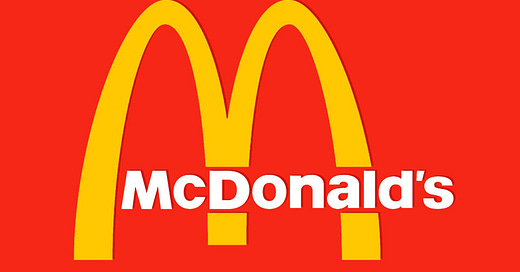Dear reader, while writing this newsletter I have personally learned a lot from discovering unique business models. If you found value from the regular editions, I would greatly appreciate it if you could share it with your network. You can click here to tweet about it.
This is Edition #6 of the newsletter. You can find the previous editions here.

About McDonald’s
McDonald’s needs no introduction but here’s some interesting history:
McDonald's Corporation was founded in 1940 as a restaurant operated by Richard and Maurice McDonald. In 1955, Ray Kroc, a milkshake-mixer salesman, joined the company as a franchise agent and proceeded to purchase the chain from the McDonald brothers for $2.7M (thus ensuring each brother got $1M cash after taxes).
Stats
🐣1940 Founded
💰$21B Revenue (2019)
👩💻38K+ restaurants & 68M Daily customers (~1% of the global population)
💸 ~$137B Market Cap
How they make money
Real Estate
McDonald’s makes money by buying land and leasing it to franchisees (often at large mark-ups) in addition to royalties of ~5% of the franchisee sales.
McDonald's keeps about 82% of the revenue generated by franchisees, compared with only about 16% of the revenue from its company-operated locations, which is further trimmed by the costs incurred in operating these units.
As of 2019, approximately 93% of all restaurants, were franchises. McDonald's has been gradually increasing the number of franchisees and is aiming for a 95% franchisee base.

The advantage of this model is that the revenue stream (rent and royalty income received from franchisees) is far more stable, and most importantly, predictable while the operating costs are measurably lower allowing for an easier path to profitability. McDonald’s, because it has control over the land and long-term leases, can leverage its market position to negotiate deals.
“We are not technically in the food business. We are in the real estate business. The only reason we sell fifteen-cent hamburgers is that they are the greatest producer of revenue, from which our tenants can pay us our rent” - former McDonald’s CFO Harry Sonneborn
Real Estate Appreciation and Tax Breaks
McDonald’s not only receives fixed rent from its franchisees but also makes money as real estate appreciates (until it doesn’t… hi there 2008). This strategy also gives huge tax relief to McDonald’s as most countries have rental tax-relief for landlords.

I’m new to this and would love to hear your thoughts. Appreciate it if you could share this with your network who might be interested in learning about such unique business models.
To receive a weekly article about a new company’s business model, subscribe now!
For more such content, follow me on Twitter.



